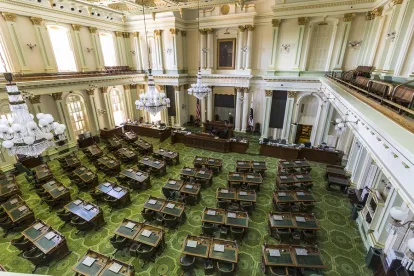Three bills currently pending in the California legislature aim to codify presumptions for workers compensation purposes about the work-relatedness of COVID-19. Governor Newsom first addressed this issue in his May 6, 2020 Executive Order No. N-62-20 (“EO 62-20”), which expired on July 5, 2020. That Executive Order created a rebuttable presumption that any “COVID-19-related illness” arose out of and in the course of the employment for workers compensation purposes, as long as the positive test or diagnosis came within fourteen days of the employee having worked, at an employer’s direction, in a workplace that was not the employee’s home or residence. The “COVID-19-related illness” (which term was undefined) must have been diagnosed by a licensed California physician, and confirmed by testing within thirty days of the diagnosis. EO 62-20 was not limited to first responders, health care workers or other essential workers, but applied broadly to all employees in the state. The broad scope of EO 62-20 may have been justified by its timing; it issued during a “shelter at home” period when it was easier to identify the dates of outside-the-home work.
Since the expiration of EO 62-20, the state has moved into new stages of pandemic restrictions, in which more workers are interacting with others outside their homes. It therefore has become more difficult, in many cases, to tie COVID-19 infection to the workplace. The three pending pieces of legislation confront these challenges by crafting workers compensation presumptions that are, in different ways, some narrower in scope than the EO.
SB 1159 codifies EO 62-20 by creating a “disputable presumption” that a COVID-19 illness arose out of and in the course of outside-the-home employment between March 19 and July 5, 2020. It extends to all California employees, and remains in place through January 1, 2024. Separately, SB1159 extends the disputable presumption through July 1, 2024 to a narrower group of employees (certain peace officers, firefighters, and healthcare workers) who contracted a COVID-19 illness after July 6, 2020. In all cases, the COVID-19 diagnosis must have been obtained within 14 days of the employee’s presence in the employer’s workplace. Employees must exhaust paid sick leave benefits and meet specified certification requirements before receiving any temporary disability benefits or, for police officers, firefighters, and other specified employees, a leave of absence. The bill would also make a claim relating to a COVID-19 illness presumptively compensable after 30 days, rather than 90 days. This bill passed the Senate and moved to the Assembly on June 29, 2020. The Assembly passed the bill on August 11, 2020 and referred it to the Assembly Appropriations Committee, which held its first hearing on the bill on August 18, 2020.
AB 196 would extend a conclusive presumption of work-relatedness in the case of COVID-19 illnesses contracted on or after March 1, 2020 by employees in industries listed as essential by Governor Newsom’s March 19, 2020 shelter-in-place order (Executive Order N-33-20). Executive Order N-33-20 made essential workers in the sixteen critical infrastructure sectors identified by the federal government. However, AB196 excludes from its coverage firefighters, peace officers, and health care employees. Heavily opposed by the California Chamber of Commerce and other business groups, AB 196 passed the Assembly on May 16, 2020, and on August 11, 2020 was referred to the Senate Appropriations Committee.
AB664 complements AB196 in that it applies to the workers excluded from AB196: peace and safety officers, firefighters, and direct care healthcare workers. The bill would establish a rebuttable presumption of occupational injury not just for COVID-19, however, but for all communicable diseases that are the subject of public health emergency declarations, diagnosed on or after January 1, 2020. The presumption would become conclusive if not rebutted within thirty days. The bill also would amend Sections 6401 and 6403 of the Labor Code to amplify an employer’s obligation to furnish a safe workplace by providing or reimbursing an employee “for emergency equipment or personal protective equipment (PPE) that provides or is ancillary to other emergency equipment or PPE that provides protection from injury for the employee.” This provision presumably is intended to underscore employers’ responsibilities to provide masks and related protections against communicable diseases. AB644 passed the Assembly on the third reading on May 13, 2020, and is currently before the Senate Appropriations Committee.
Given the mounting workers compensation and tort litigation related to COVID-19, and the rapid legislative progress of these bills thus far, it is very likely that at least one of them will pass the California legislature in some form. Perhaps of greatest concern to private sector employers is AB 196, with its unprecedented conclusivepresumption of COVID-19 work-relatedness for private sector employees in the federal critical infrastructure sectors. Now is the time to contact state legislators to share such opinions.





 />i
/>i
